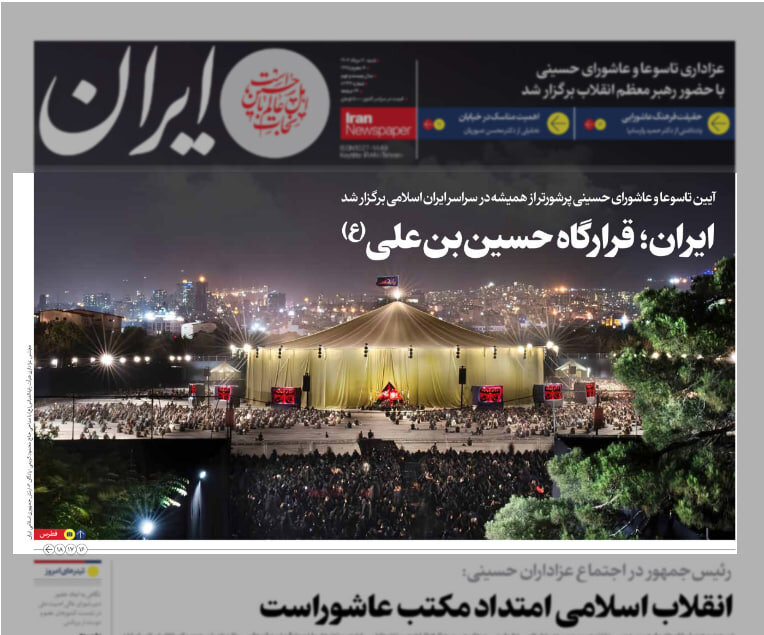Biden's America is Trump's America!

In a note, the Iran newspaper addressed the audio file of the U.S. special envoy for Iran Robert Malley whose security clearance has been suspended and put on unpaid leave. It wrote: Although it is not clear when exactly the audio was recorded, many in Western media outlets believe the incident heralds U.S. strategic failure in West Asia. By fostering new economic, security and military alliances with Washington’s rivals, Russia and China, Iran has proven that it has emerged as the winner of the new game in the region.
The American sanctions on Iran’s oil and banking systems seem to have failed as the country has abandoned the “begging diplomacy” and embarked on a new foreign policy trajectory by forging relations with new partners. The process of de-dollarization and stolen Iranian oil getting sidestepped by American buyers have caused the Biden administration to receive scathing criticism. Amid all of this, calls by some senior supporters of the JCPOA that Iran should start “comprehensive negotiations” with the U.S. shows that their understanding of foreign policy has not evolved at all over the past decade.
Kayhan: Will the JCPOA show a way out or lead to more sanctions?!
In a commentary, Kayhan discussed the policy of further sanctions against Iran through the JCPOA. It wrote: The JCPOA was a one-sided agreement from the beginning, whose function was to put pressure on Iran and turn our country into an obedient player in the international system. Although the reformists and a group of principlists who were deceived by the JCPOA are trying to present this deal as a solution to the country's problems, the reality is that the JCPOA was never meant to resolve issues between Iran and the West and it was never going to boost cooperation between the two parties. Rather, the JCPOA was another tool used to mount pressure on Iran. Even if the U.S. decides to return to the JCPOA, as pointed out by Robert Malley in the leaked audio, the agreement will act as a bridge towards more U.S. pressure. Washington will put forth new nuclear and missile demands and use various pretexts to justify them. Basically, history will repeat itself and the events of the past years will happen again. The JCPOA is meant to make room for new excessive demands from Washington and turn Iran into an obedient country that will surrender its security guarantors to be able to sell oil.
Siasat-e-Rooz: Iran's military power is the West’s nightmare
In an analysis of the military cooperation between Iran and Bolivia, Siasat-e-Rooz wrote: Following Bolivia's interest in buying powerful Iranian drones, the United States has expressed concern about any military cooperation between Tehran and Latin American countries. Various think tanks and media outlets in the West believe that Iran is interested in the latest and most advanced technologies, either it is putting more resources into its cyber capabilities in the last decade or trying to use artificial intelligence in many cases. Therefore, the U.S. wants to implement its sanctions more carefully so that its other rivals cannot get their hands on the latest technological advancements. Westerners believe that Iran has built a cruise missile as a countermeasure to the U.S. presence in the region. The Western media considers Iran’s latest unveiling of the Abu Mahdi missile as well as the "Fadaian Harim Velayat” air maneuver, as a power display in the face of the Pentagon's destabilizing actions in the region. Underestimating Iran's missile and naval achievements, the U.S. has claimed to send a new air fleet to the region, while ample evidence shows that the countries in the region are far from convergence with the U.S. and instead are seeking more interactive approach with Iran.
Javan: India's interest in trade with Iran
In a commentary, Javan discussed the conversations between India's National Security Adviser Ajit Doval and Iran's Supreme National Security Council Secretary Ali Akbar Ahmadian on the sidelines of a BRICS meeting in South Africa and said: International experts believe that the Chabahar project can be a suitable platform for the expansion of economic relations and interactions between Iran and India. That’s why sanctions against Iran must be removed so that both countries can enjoy the benefits of this cooperation. One of the topics considered by Iran and China is the expansion of Chabahar port in terms of infrastructure in order to create the necessary basis for Indian investment, while the Indians are trying to connect the Chabahar port rail line to the Bam-Fahraj rail line and eventually reach the country's national railway to have more investment opportunities. If the sanctions get lifted, Indians will become more interested in investing in the free zones of Iran, building dozens of factories in the free port of Chabahar and investing in the fields of automobile manufacturing, steel, petrochemicals, electricity generation and many other projects, which will bring about huge benefits for both countries.
Leave a Comment